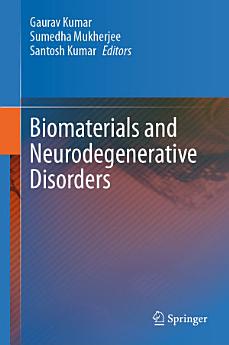Biomaterials and Neurodegenerative Disorders
Acerca de este libro electrónico
Acerca del autor
Dr. Gaurav Kumar is currently working as an Associate Professor in the Department of Biomedical Sciences, Galgotias University, Gr. Noida, Uttar Pradesh, India. He is also the institution's innovation council in-charge and nodal officer of the atal ranking of institutions on innovation achievements (ARIIA) at Galgotias University. He obtained his PhD degree from the School of Biomedical Engineering, Indian Institute of Technology (Banaras Hindu University), Varanasi, UP, India in 2019. He served as Assistant Professor, Shobhit University, Gangoh, Saharanpur, and Assistant Professor at Shobhit University, Meerut; Lecturer at Sardar Vallabhbhai Patel University of Agriculture and Technology, Meerut and a Research trainee at CSIR- Central Scientific Instrumentation Organization, Chandigarh. He received several awards. His research acumen and inclination in various disciplines, such as neuroscience, biomedical engineering, biotechnology, bioinformatics, life sciences, and herbal study in medicine.
He has published many research/review papers in reputed peer-reviewed journals, books and book chapters. He has published 14 national and international Patents. He has presented his research work at several international and national conferences in India and abroad. He is an active member of several reputed scientific societies including, the Society for Neuro Chemistry India, IRED, Indian Academy of Neurosciences, IAENG (The International Association of Engineers), IEEE (The Institute of Electrical and Electronics Engineers) India. He is on the editorial board and reviewer board of various SCI-indexed journals. He has delivered many invited talks in workshops and conferences. He has supervised and currently supervising 25 UG/PG and PhD scholars.
Dr. Sumedha Mukherjee is currently working at the Department of Biomedical Sciences, Galgotias University, Gr. Noida, Uttar Pradesh, India, as an Assistant Professor. She has completed her PhD from the School of Biomedical Engineering at the Indian Institute of Technology (BHU), India. She studied the neuroprotective ability of endogenous hormones and phytochemicals in the cerebral ischemia model for her doctoral research and published a few international papers and book chapters. She also presented her work at several national and international conferences in India and abroad. After completing her PhD, she joined the University of Liege, Belgium as a post-doctoral research fellow and worked on a collaborative scientific project with Mithra Pharmaceuticals in Belgium. During her post-doctoral research, she worked with the fetal hormone estetrol, to explore its ability to inhibit necroptosis, a programmed necrotic cell death, in the context of cancer and neonatal hypoxia encephalopathy. 6 patents have been filed and published from her post-doctoral research. Dr. Sumedha Mukherjee’s research interests are mainly cerebral ischemia and hypoxia, cell death pathways, neuroprotection and drug delivery.
Dr. Santosh Kumar is currently working as an Associate Professor in the Department of Chemistry, Harcourt Butler Technical University Kanpur, India. He also served as a Research Professor in the Department of Organic and Nano System Engineering, Division of Chemical Engineering, Konkuk University, Seoul, South Korea. Dr. Kumar received his B.Sc, M.Sc. in chemistry and D. Phil. in organic chemistry from the University of Allahabad, India. He worked as a research associate (CSIR) at the Department of Chemistry, Motilal Nehru National Institute of Technology, Allahabad, India. He was awarded a CAS-TWAS postdoctoral fellowship in 2008 and worked at Changchun Institute of Applied Chemistry, Chinese Academy of Sciences, Changchun, China. Later he joined as a KU Brain Pool professor and researcher at the Konkuk University, Seoul, South Korea (2010-2013). He was awarded FCT postdoctoral fellowship 2012; worked in Chemistry Centre, University of Coimbra, Coimbra, Portugal (2013-2017). During his career, Dr. Kumar has published more than 101 research papers, edited books and book chapters, attended and participated in local and international workshops, and conferences. He also served as a member of different organizing committees and an editorial board member and reviewer at several scientific journals. Current research interest involves source apportionment of chemical modification, optical and biological properties of chitosan biopolymer for biomedical applications, hydrogel, aerogel, nanomaterials, drug and gene delivery and environmental chemistry.






